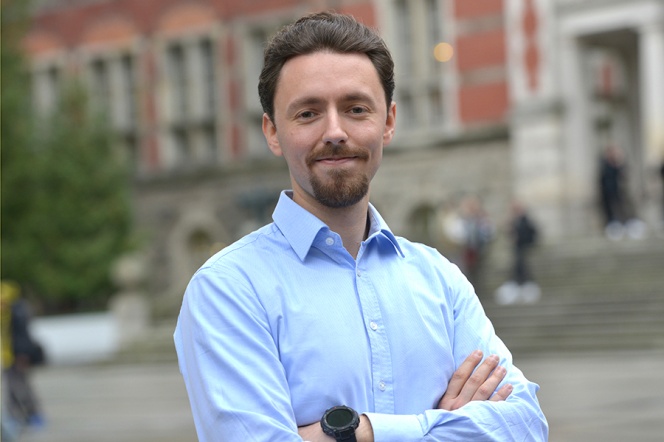Date added: 2023-11-08
Underwater acoustic communication in the research work of a graduate of the Doctoral School

His doctoral thesis "Local basis function method in the identification of non-stationary processes" was written under the supervision of prof. Maciej Niedźwiecki from the Department of Signals and Systems at FETI. Process identification is a field that deals with creating mathematical models of phenomena (objects or signals) based on experimental data. The PhD student's research focuses on building models in underwater acoustic communication.
– Let's imagine a situation where we have two underwater objects that send acoustic signals to each other. The problem occurs when sending a signal and receiving a signal from another object at the same time. What reaches me will be contaminated by the signal I send and there will be reflections of this signal, e.g. from the water surface or from various underwater objects moving in this area. In my research, I remove such interference from the received signal by modeling the underwater channel as a system with parameters that change over time, explains the scientist. – The methods I propose in my research on this problem are a computationally cheap variant of the most effective methods in this field. Moreover, in underwater communications, model parameters typically behave very differently. Each of them is related to the reflection of sound from a different element. As a result, some of the parameters of such a model are constant, some change faster, others slower, and still others are simply zero. Another novelty of the method I am dealing with is the ability to analyze each model parameter separately.
The doctoral thesis is a continuation of research conducted by the young researcher already during his master's studies. The PhD student is currently a full-time employee of Gdańsk University of Technology. He plans to defend his doctoral thesis in early 2024.
– Research work requires a specific approach: asking questions, digging deeper, and not being satisfied with simple solutions. You have to be inquisitive and patient. I think I have these features and for me, choosing the Doctoral School was a very good solution, despite the temptations of working on the commercial market, especially for graduates of my faculty. But it was a conscious and well-thought-out decision. I was and still am lucky to work with prof. Maciej Niedźwiecki, a world-class scientist who is willing and able to share knowledge. Finding such a mentor is the most valuable part of my doctoral studies.
Apart from his scientific work, Artur Gańcza is great at teaching.
– Transferring knowledge and sharing my experiences is a very important aspect of my work for me. I really love teaching, inspiring, showing how to acquire knowledge better, more effectively, and what to pay attention to when learning a given material. I am glad that I can not only be a scientist, but a lecturer as well.
In the near future, the scientist wants to work on the Volterra group of models and analyze methods that are less sensitive to impulse noise in signals.

